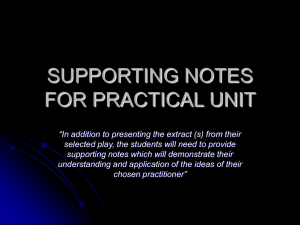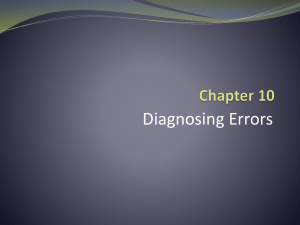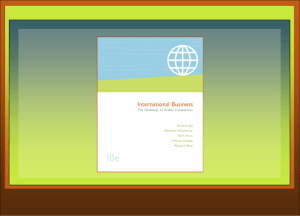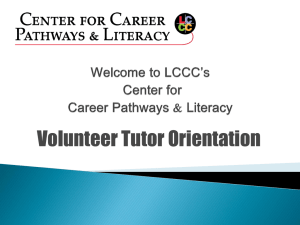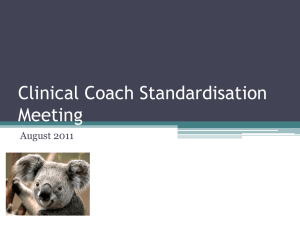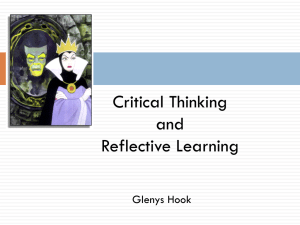Standards that influence the way a practitioner`s role is
advertisement
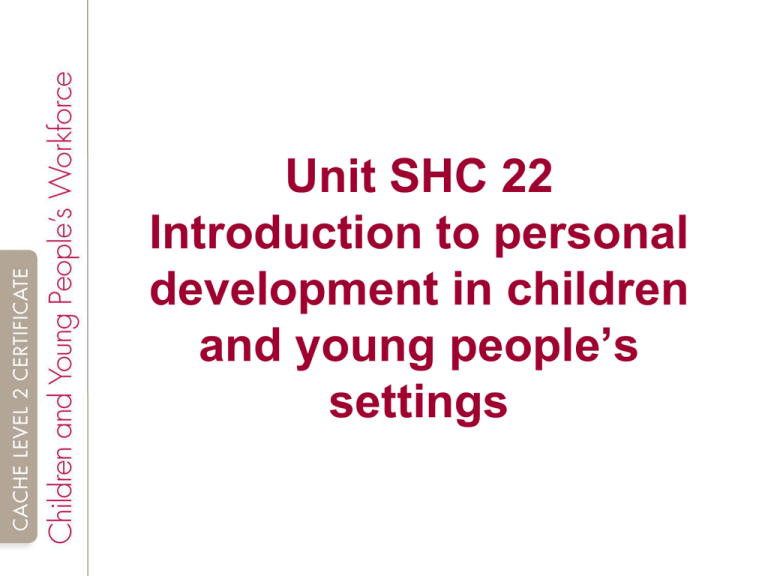
Unit SHC 22 Introduction to personal development in children and young people’s settings SHC 22 Introduction to personal development in children and young people’s settings 3 credits 4 areas in this unit: • Understand what skills are needed by a practitioner • Think about how they are performing in the work setting and agree a personal development plan • Make decisions about their own training and personal development • Develop the knowledge, skills and understanding that will improve practice. BIG PICTURE A;LEKJ;ALKSDJF A;LKSDNF ;AKLSDF ASD AS SA Responsibilities of a practitioner’s role 1.1 A practitioner needs to have the following: • respect for the principles of confidentiality – all information given within the work setting should be treated as confidential, unless the safety or wellbeing of the child or young person is at risk • a commitment to avoid gossip about any child/young person • an understanding of the need to avoid stereotyping • a commitment to meeting the needs of children/young people – all should be treated with respect and dignity • an understanding of the need to work within the guidelines of an equal opportunities code of practice • the ability to work with a child/young person in a way that does not allow personal preferences or prejudices to influence them. Duties and responsibilities of a learner in the work setting 1.1 • • • • • • • . As a learner, you will be assessed on your understanding of your own role in the work setting. You will need to know: What are your duties and responsibilities? What you are expected to do whilst on work placement. Which duties have been allocated to you? Job contract, job description, guidelines? How to carry out allocated tasks (you must ask for guidance if you are unsure). Who you are responsible to and to whom you must report (line manager, supervisor, teacher etc.) Research a job in childcare and find out the above www.nurseryjobs.co.uk A learner’s role 1.1 Use their own initiative showing consideration for others • to deal with incidents • to respond to safety issues • to maintain behaviour according to placement guidelines Conduct themselves personal hygiene appearance A learner needs to know how to Maintain a professional relationship with the children/young people in their care Manage their own attitudes Speak Speak politely Use correct terms Keeping a Reflective Diary 2.3 • Reflective Diaries are a personal record of all your experiences (positive and not so positive) throughout your placement. • They are used to report your thoughts, feelings and opinions – not recording the events of each day. • They can be used to describe and evaluate: activities you have provided for the young people or children how you have responded to their behaviour How well do how you have communicated with colleagues you think things how you have communicated with parents/ have gone? carers What would your contribution to teamwork. you change next time? Skills for Work ACTIVITY 1 In groups of 4 Each group has a different role working with children and young people Brainstorm in groups of 4- what skills do you need to do this role? What are your responsibilities? Record on flipchart paper and feedback The Induction Process For those who are newly recruited, promoted, existing role is changing Why is induction important? Induction Timetable Example of an Induction Timetable for new employee: Sarah Smith (Part time hours: 9am-3pm) Induction from 2nd January – 4th January Job: Nursery Nurse Date employment begins: 2nd January 2011 Day 1: 2nd Jan Line Manager: Mrs Jackie Rose 9am: Welcome, tour, orientation, introductions 9.30am: Staff meeting 10.30am: Coffee break 10.45am: Meeting with Nursery Manager/ Line Manager 11.45am: Free 12.00: Lunch 12.30pm: Meeting with Borough Manager, Emma Pollard 1.30pm: Free 2.30pm: Meeting with nursery nurses, Anna and Charmain Day 2: 3rd Jan: First Aid Course Skills involved in working with and caring for children and young people In pairs, discuss what skills are needed to work with children and young people. Record your answers • being able, through experience and with support, to reflect on experiences and learn from them • having the confidence and ability to respond to the individual needs of the child or young person • gaining an in-depth understanding about each child/ young person and being able to make appropriate judgements based on this • being open-minded and prepared to learn from the child/ young person in their care. Working with others To work effectively as part of a team, a practitioner must: • Show respect to parents and other adults (even if they don’t agree with their views, they must respect their wishes and views). • Be a good team member and have an understanding of their own role and the roles of others in the team. • Communicate effectively with those they work with – parents, team members and other professionals. The Legal Stuff 1.2 There are standards that influence the way a practitioner’s role is carried out; • National standards are set to help children and young people thrive, develop and grow. • It is important to be aware of the following: National Occupational Standards • describe the values, knowledge, skills, attitudes and actions required for a specific job • written as statements of competence. • • • • Regulations The Children Act 2004 The Health and Safety at Work Act The Care Standards Act 2000 The Data Protection Act Standards that influence the way a practitioner’s role is carried out (2) 1.2 National Minimum Standards such as the EYFS welfare requirements: • safeguarding and promoting children’s welfare • suitable people to look after children • suitable premises • suitable environment and equipment • organisation and documentation. Codes of Practice, Policies and Procedures relevant to each setting. •TASK PAGE 19 (textbook) Working to meet the required standards 1.2 • In every setting, there will be expectations of how a practitioner should work and conduct themselves. • Many settings are regulated and inspected – they have to comply with certain standards. • These standards set out the principles and values which ensure that the young people/children in the setting get the best possible developmental opportunities. What are the codes of practice and which standards are followed in your work setting? Our Beliefs, values and attitudes 1.3 • How do our beliefs, values and attitudes affect our everyday lives? • Exploring our attitudes and values, discuss in pairs, textbook page 20 • Children and young people learn moral values by example and imitation. • Attitudes towards others are based on beliefs and feelings about the world. • It is important for children and young people to have positive role models so that they can learn to imitate positive behaviour and attitudes. How can you ensure that your personal attitudes or beliefs will not affect the quality of your work? Personal attitudes and beliefs 1.3 It is important to make a conscious effort not to allow personal values to negatively affect a practitioner’s work. His/her own strengths and weaknesses What a practitioner must be aware of This self awareness will enable the practitioner to identify his /her own personal attitudes and beliefs. His/her own values Where have they come from? His/her own learning needs Where have they come from? Knowing Yourself • Personal attitudes • Self awareness • Non judgemental attitude • Task Write in your books: What are your skills, strengths and weaknesses? What do you know about yourself and what do you enjoy doing? Self Awareness • Is self awareness important for self development? • Watch the following video clips and answer the questions on the worksheet: • http://www.youtube.com/watch?v=Wpc_M2qI74&feature=related • http://www.youtube.com/watch?v=vA2cDV4K9jg Reflective practice 2.1 & 4.2 It is important to reflect on and review your work with children and young people. You might wish to: • • • • • What went well and why? What did not go well and why? What might have been done differently? What have you achieved and what do you still need to work on? • • Set yourself some goals/ targets Keep a record of your of your thoughts and ideas Talk things over with another learner / friend Your assessor will expect you to explain why all this helps. You will need to say how it has • increased your knowledge • developed your skills • advanced your practice. Assessing own knowledge, skills and understanding 2.2 • A learner needs to reflect on their own practice and to consider how far their own knowledge, skills and understanding meet the standards expected. Are there any gaps? Appraisals Your manager will help you to identify areas where you are doing well, areas for improvement and give you support in developing your skills, knowledge and expertise. Ways of reflecting Keeping a Reflective Diary Self-evaluations How far do you think your skills knowledge and understanding are meeting the standards? Sources of support for own learning and development 3.1 Support for your learning and development is very important and may be provided by people within your work setting and by outside agencies. training provided in-house staff meetings sources of support discussions with staff team training by outside agencies appraisals internet e-learning Which of these are formal and which are informal? Personal Development Plans A personal development plan is a document that maps out how a person can develop skills and make progress. A personal development plan will: • Help a learner to take responsibility for their own professional development. • Increase a learner’s awareness of their strengths and weaknesses. • Motivate a learner to develop their own skills. • Help a learner to decide what training they require. Agreeing a Personal Development Plan 3.2 • You will not have to draw up your plan on your own – your manager/ supervisor will help you. • You do not have to take sole responsibility for agreeing your plan. • Your supervisor, line manager, parents, carers and advocates can contribute. Creating a personal development plan • Identify your skills, strengths and weaknesses. • Decide which areas you want to develop. • Create a plan. • Discuss your plan with others. • Put your plan into action. • Review your plan. Writing a Personal Development Plan 3.3 Working with your tutor/placement supervisor, decide on: • Your targets – what do you want to achieve in your learning, work and personal life? How will you know when these targets have been met? • The actions you will take (action points) to achieve your targets. • The dates (deadlines) for completing your targets. • The help and support you will need. • Details of who will review your progress and where and when this will take place. • Complete your PDP! Review State one thing

